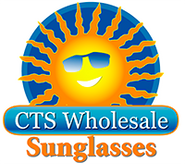Sunglasses, stickers and UV ray protection
Posted by James on 4th Aug 2014

At CTS Wholesale Sunglasses we love to receive emails from readers. Following a recent post regarding sunglasses and eye protection, a reader asked a great question. He wanted to know what was meant by the UV number, usually seen on stickers or tags of new sunglasses.
So, I'm going to quickly explain what the UV rating means, in plain English.
Sunglasses and UV numbers
UV (ultra violet) rays come from the sun and can cause damage to the human eye. Both types of UV rays (UVA and UVB) are potentially harmful.
The UV protection provided by sunglasses is measured using a technique, called spectrophotometry. This measures the effectiveness of lenses at either absorbing or reflecting UV rays, so they don't reach your eyes.
Therefore, the higher the UV number (from 0 to 100) the greater your level of protection.
The correct sunglasses for your needs
It's important to get the correct level of UV protection for your specific needs. For example, some lower UV rated sunglasses are fine at providing protection when you're driving, but far less effective at protecting you from UV rays when you're at the beach, in the water or skiing.
Note: Many surfers, skiers and beach lovers who fail to wear sunglasses with sufficient UV protection, get a condition called Pterygium, sometimes called surfer's eye. This is a nasty condition, which can be largely avoided with correct UV protection.
So, make sure you get the right kind of UV protection for your needs. When surfing, skiing or in the water, get as close to 100% as you can. Also, opt for either wraparound designs or sunglasses that are a snug fit, as these block more rays than loose-fitting sunglasses, with the same UV protection.
Dennis Robbertson M.D. from the world famous Mayo Clinic makes your decision simple. He advises that you should only wear sunglasses with either 100% or 99% UV. He also makes a great point, which is that you need to avoid any sunglasses, which fail to offer a UV protection percentage. Never assume that because a pair of sunglasses look well made or because you know the retailer, that the sunglasses will offer you the protection you need.
Important
A common mistake people make when choosing sunglasses, is to assume that the darkness of the lens determines the level of UV protection. This is not the case. For example, in the United States, regular non-tinted prescription glasses come with UV protection. Just as these seemingly clear lenses DO offer UV protection, dark sunglasses are not guaranteed to offer any UV protection, unless stated. The message here is clear. Always check the UV number.
At CTS Wholesale Sunglasses, we're passionate about sharing education, to help you better protect your eyes from the sun. If you have any questions, just let us know, by clicking here.
I hope you found this brief guide to UV and sunglasses useful. If you did, please share it with your friends.
We love sunglasses!
Yes, we're passionate about sunglasses. Just ask our retailers!
This is why CTS Wholesale Sunglasses is here for you, 365 days a year. We help our retailers to provide high quality products to their customers. So, if you're a retailer and you would like to know more, use the "contact" link at the bottom left of this page. We look forward to hearing from you.
